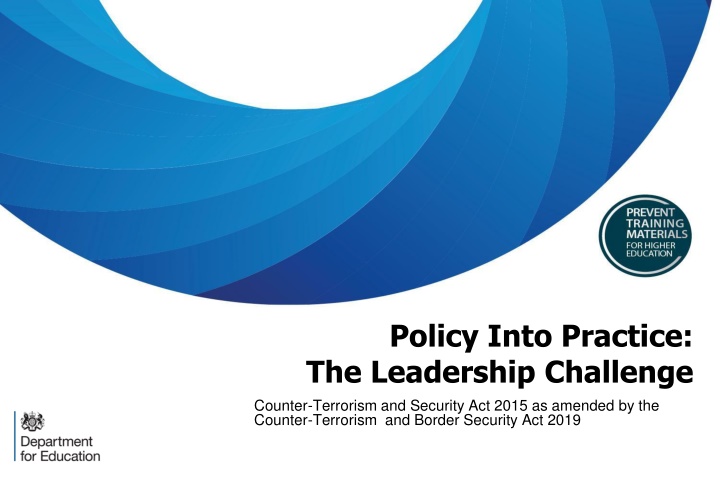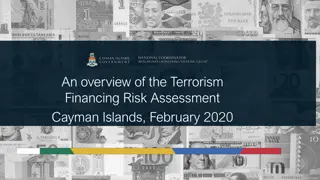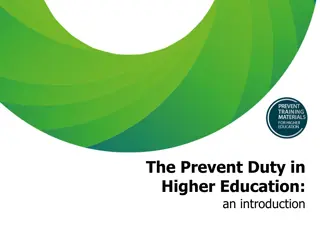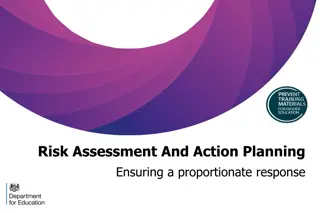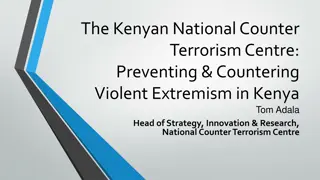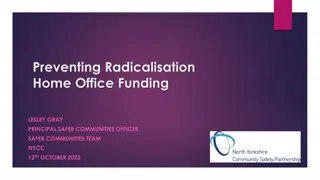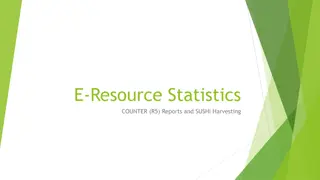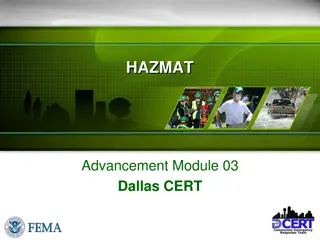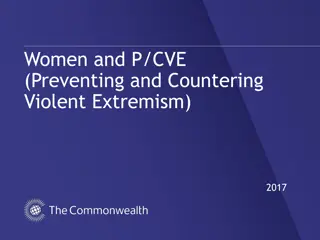Leadership Responsibilities in Counter-Terrorism Policies
Leadership roles under the Counter-Terrorism and Security Act involve establishing mechanisms to understand radicalization risks, ensuring staff capabilities to address these risks, promoting duty importance, and maintaining effective policy implementation. Governing bodies must provide annual assurance on duty fulfillment to monitoring authorities like the Office for Students (OfS). Effective delivery includes internal and external partnerships engagement.
Download Presentation

Please find below an Image/Link to download the presentation.
The content on the website is provided AS IS for your information and personal use only. It may not be sold, licensed, or shared on other websites without obtaining consent from the author.If you encounter any issues during the download, it is possible that the publisher has removed the file from their server.
You are allowed to download the files provided on this website for personal or commercial use, subject to the condition that they are used lawfully. All files are the property of their respective owners.
The content on the website is provided AS IS for your information and personal use only. It may not be sold, licensed, or shared on other websites without obtaining consent from the author.
E N D
Presentation Transcript
Policy Into Practice: The Leadership Challenge Counter-Terrorism and Security Act 2015 as amended by the Counter-Terrorism and Border Security Act 2019
Outline Expectations of those in leadership positions under the Counter Terrorism and Security Act 2015 (CTSA 2015) Office for Students (OfS) monitoring framework Responsibilities of accountable officers/governing bodies: Providing assurance Effective delivery Communication OfS role in reporting to government Who will OfS monitor? Timetable
Sector-specific guidance The revised Prevent duty guidance for England and Wales (July 2015) identifies three themes that recur throughout the sector specific guidance: leadership working in partnership capabilities What does the Prevent statutory guidance say about leadership ? How and on what will RHEB s be monitored?
Expectations of those in leadership positions For all specified authorities, there is an expectation that those in leadership positions: establish and maintain mechanisms for understanding the risk of radicalisation. ensure all relevant staff understand the risk and build capabilities to deal with it. communicate and promote the importance of the duty. ensure the effective implementation of the duty.
What does this mean? Leaders must not only ensure that appropriate policies are in place but that they are properly followed and applied. properly thought-out procedures and processes( ). Compliance will only be achieved if these procedures are properly followed and applied and implemented .
Providing assurance The governing body is required to give an annual assurance to the monitoring authority to demonstrate that the relevant body is meeting the duty and that there is evidence of ongoing engagement and active implementation of the duty. In England, this is the Office for Students (OfS) and in Wales it is Higher Education Funding Council Wales (HEFCW). Different arrangements apply in other devolved authorities in the UK.
Effective delivery (1/2) Leaders will be expected to ensure that providers are delivering in the following areas: Internal partnership there is a specific requirement to engage and consult with students and staff on implementing Prevent. External partnership with whatever the local Prevent arrangements are. Primarily the local multi agency meetings and with the HE Regional Prevent Coordinator Effective risk assessment and action planning to address any identified risks. Building the capabilities of staff an appropriate training plan and active engagement with it. Implementing the duty and having in place procedures that uphold the principles of academic freedom and freedom of speech.
Effective delivery (2/2) Effective IT policies that do not constrain learning and teaching and research. Protocols for sharing information (internally and externally) and meeting the requirements of data protection and confidentiality. Student and staff safeguarding/wellbeing policies with a procedure for raising concerns about individuals who may be vulnerable to being drawn into terrorism. Effective arrangements for working with students unions, student societies or student representatives. An effective communication plan including a set of regular reports that measure impact and effectiveness.
The monitoring framework - England The original monitoring framework was published in December 2015, setting out how it will gather information from Relevant Higher Education Bodies (RHEBs) to demonstrate to government that the higher education sector is compliant with Prevent. The latest framework by the OfS (published in September 2018) has moved to a more evidence and risk-based approach to monitoring.
Providers registered with Office for Students (OfS) Providers that are not registered (do not receive public funding) but have more than 250 higher education students (the majority must be on campus and not remote) Providers that are designated for student support by the Secretary of State (e.g. for the purposes of 'teach out ) The autonomous colleges, schools and halls of the Universities of Cambridge, Durham and Oxford.
OfS requirements 1. Accountability and Data Returns (ADRs): Annual basis Requires signed declaration and accountability statement from the governing body/proprietor 2. Prevent Review Meetings (PRMs): PRMs give insight into how the provider is actively implementing the duty through its policies and processes. Providers which may be subject to PRM include new entrants to monitoring, higher risk providers and a random sample. Prevent reviews may be triggered in response to particular circumstances or risk indicators. 3. Informing OfS of any material changes to policies, changes in circumstances and any serious Prevent- related incidents.
Serious incidents and material changes Serious Incidents -report any serious incidents to OfS: as soon as possible. not business as usual no reporting of straightforward Channel referrals or informal contact with police. should include any incident which triggers revisions to the Prevent policies or which constitute a serious reputational risk. Material Changes: A requirement to report significant changes to policies previously assessed by OfS. Changes of responsibility for Prevent, changes of control (e.g. new governance structures).
Provision of data Accountability and data returns are required in the key areas: staff training, events and external speakers, welfare concerns referrals to Channel Data will inform monitoring at an individual institutional level eg if significant outliers suggest issues that need further investigation or where data raises further questions. Data will not be used alone to draw conclusions about the success or otherwise of policies and will only be published at an aggregated sector level.
Reporting to Government OfS will report on a periodic basis to DfE on the sector s implementation of Prevent and will publish annual updates on its monitoring work OfS may report where other circumstances apply: a) where it concludes that an RHEB is either not providing required information or is not fulfilling its Prevent duty and efforts to resolve this have failed. b) where there are particular issues raised during any review process. c) where there are particular concerns which mean that government has asked for further assurance about a provider s policies and procedures. If a provider has been referred to DfE, DfE may in turn make a referral to the Home Office Prevent Oversight Board. If all other options have been exhausted, the Home Secretary has the power to issue directions. [Found in s30 of the Counter Terrorism and Security Act 2015]
Further support for the sector Alongside its monitoring role, OfS is working with key partners to undertake a broader programme of activity to promote an environment of continuous improvement. This has included: Undertaking a series of thematic reviews or deep dives . Supporting the development and sharing of what works to facilitate the sharing of good practice and case studies. Undertaking a programme of engagement visits to providers to gather further feedback on any new issues and practices. Regional and local support can be accessed through the network of DfE FE and HE Prevent Regional co-ordinators. Further information is available on the OfS website.
Summary Clear leadership Proportionality and perspective Clear policies and procedures Transparency and good communication Partnership with internal and external stakeholders Without effective leadership, effective implementation of the duty will not ensue
